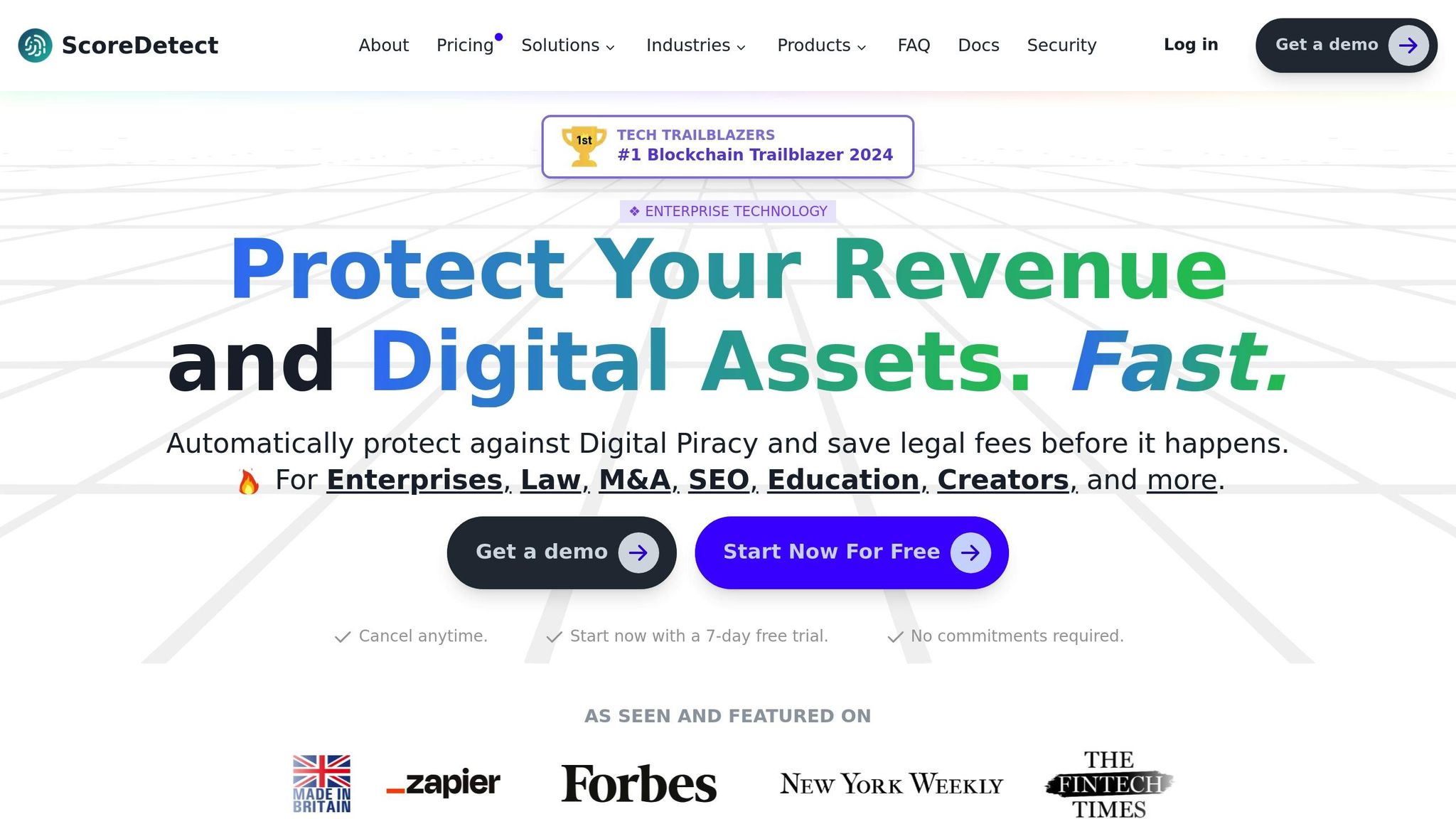CAPTCHAs can disrupt web scraping – but there are ways to bypass them effectively. Here’s a quick overview of what you need to know:
- What is CAPTCHA? A test to differentiate humans from bots, often using puzzles, distorted text, or image selection tasks.
- Why it matters: CAPTCHAs block automated scraping and can lead to IP bans or slow workflows.
- How to bypass CAPTCHAs: Use proxies (residential, datacenter, mobile), simulate real browser behavior, and leverage AI tools like computer vision and natural language processing.
- Legal considerations: Always comply with website terms of service and data privacy laws like GDPR and CCPA.
- Enterprise tools: Advanced platforms like ScoreDetect combine AI and blockchain for large-scale, compliant CAPTCHA bypassing.
These strategies help you scrape data efficiently while staying within legal boundaries. Read on for a detailed breakdown of CAPTCHA types, challenges, and solutions.
How to Bypass CAPTCHA in Web Scraping Using Python
CAPTCHA Types and Obstacles
Modern CAPTCHA systems are a major hurdle for web scraping tools. Understanding the challenges posed by each type can help refine strategies to bypass them.
Image CAPTCHA Systems
Image-based CAPTCHAs are among the toughest to crack for automated systems. They typically display a grid of images and ask users to identify specific objects, like traffic lights, crosswalks, or storefronts.
Here’s why they’re so challenging for bots:
- Complex Object Recognition: Objects may be partially hidden, shown at odd angles, or presented in varying lighting conditions.
- Context Understanding: Some tasks require recognizing relationships between objects, not just identifying them individually.
- Dynamic Libraries: CAPTCHA providers frequently update their image collections to prevent bots from reusing cached solutions.
- Intentional Distortion: Noise, overlapping elements, and other visual tricks are added to confuse automated image recognition systems.
Despite these barriers, advanced AI models have achieved impressive success rates – sometimes as high as 97% in solving these CAPTCHAs [4].
Text and Audio CAPTCHA Methods
Text and audio CAPTCHAs, though older, still hold up well against automation. They use a combination of techniques to trip up bots:
| Feature Type | Text CAPTCHA Challenges | Audio CAPTCHA Challenges |
|---|---|---|
| Distortion | Warped characters, overlapping letters | Voice modulation, varying speeds |
| Noise | Random lines, dots, and patterns | Background sounds or static |
| Variation | Different fonts, sizes, and styles | Varied accents and tones |
| Segmentation | Connected or merged characters | Unclear word boundaries |
These obstacles make it difficult for automated tools to process text or audio CAPTCHAs accurately.
Advanced CAPTCHA Systems
Modern CAPTCHAs like reCAPTCHA v3 and hCaptcha have moved beyond traditional challenges. Instead of relying on explicit tasks, they focus on analyzing user behavior. These systems monitor factors like:
- Natural mouse movements
- Typing rhythm and speed
- Page navigation patterns
- Time spent interacting with content
- Browser configuration and settings
This behavior-based approach represents a significant shift. For example, reCAPTCHA v3 evaluates dozens of interaction signals across an entire browsing session to determine whether the user is human [3]. Bots, on the other hand, typically display unnatural behavior – such as processing pages too quickly or interacting with elements in a predictable manner [3][4].
CAPTCHA Bypass Methods
Navigating CAPTCHAs has become a key challenge in modern web scraping. To handle these obstacles responsibly and effectively, several advanced techniques come into play.
Proxy and IP Management
Proxies are essential for bypassing CAPTCHAs, and each type offers unique benefits:
- Residential proxies: Imitate real user behavior, making them harder to detect.
- Datacenter proxies: Offer fast and cost-efficient performance.
- Mobile proxies: Utilize dynamic IP rotation for added flexibility.
By carefully managing request timing and distributing traffic across a well-structured proxy network, you can reduce the chances of detection. But proxies alone aren’t enough – browser simulation takes the process a step further.
Browser Simulation Tools
Simulating real user activity is another powerful way to bypass CAPTCHAs. Modern scraping tools go beyond simple HTTP requests to mimic genuine browser behavior. Key features include:
- JavaScript execution: Fully processes JavaScript, just like a real browser.
- Cookie management: Keeps session data consistent and realistic.
- Header customization: Uses authentic browser headers to avoid suspicion.
This level of simulation greatly increases the success rate of CAPTCHA bypass efforts. To enhance these methods even further, AI-based solutions are proving to be game-changers.
AI-Based CAPTCHA Solutions
Artificial intelligence has revolutionized CAPTCHA solving by tackling challenges in innovative ways:
- Computer vision: Deciphers visual puzzles with remarkable accuracy.
- Natural language processing: Handles audio-based CAPTCHAs effectively.
- Behavioral analysis: Identifies and interacts with dynamic elements like a human user.
The key to overcoming CAPTCHAs lies in combining these strategies. By integrating proxy management, browser simulation, and AI tools, you can create a system that’s adaptable to even the most complex protections.
sbb-itb-738ac1e
Business-Scale CAPTCHA Solutions
When it comes to enterprise-level web scraping, businesses need CAPTCHA solutions that can handle massive data volumes while staying reliable and compliant with regulations. These solutions are essential for maintaining efficiency and ensuring success in high-demand environments.
Automated CAPTCHA Processing
At the heart of large-scale CAPTCHA handling are distributed networks designed to process multiple requests simultaneously. These systems are built to:
- Spread workloads across multiple servers while monitoring performance metrics.
- Deliver high success rates, even during peak traffic times.
- Adapt quickly to evolving CAPTCHA formats.
- Provide detailed performance analytics for better decision-making.
These automated networks set the stage for platforms like ScoreDetect, which integrates cutting-edge AI and blockchain technologies to enhance web scraping operations.
ScoreDetect Web Scraping Features

ScoreDetect takes enterprise web scraping to the next level by leveraging sophisticated AI to ensure consistent and efficient performance. Its intelligent targeting system allows businesses to collect data effectively while adhering to website policies.
"ScoreDetect is exactly what you need to protect your intellectual property in this age of hyper-digitization. Truly an innovative product, I highly recommend it!" – Imri, Startup SaaS, CEO [1]
Key features of ScoreDetect include:
- Smart, targeted data scraping.
- Non-intrusive data collection methods.
- Seamless integration with over 7,000 web apps via Zapier.
- Real-time verification and authentication processes.
To further enhance its capabilities, ScoreDetect incorporates blockchain technology for secure and transparent data handling.
Blockchain Verification Methods
ScoreDetect uses the SKALE blockchain to ensure transparency and trust in its web scraping operations. The blockchain-based verification process includes:
- Instant creation of checksums to validate data integrity.
- Zero-gas-fee transactions for cost-efficient operations.
- Rapid generation of verification certificates.
- Improved compliance with Google’s E-E-A-T guidelines.
- Immutable logs of all actions for full accountability.
"As a SaaS company owner, I find ScoreDetect to be a highly valuable tool for ensuring the integrity of our digital content." – Joshua Chung, Startup Consultancy, CEO [1]
This blockchain integration is especially useful for industries like finance, healthcare, and legal services, where strict documentation of data provenance is critical. At the same time, it ensures operational efficiency without compromising on compliance or security.
Key Points for CAPTCHA Bypass
To tackle CAPTCHA challenges effectively, it’s essential to focus on strategies like managing IPs, leveraging advanced OCR technology, adhering to legal guidelines, utilizing enterprise-grade tools, and staying ahead of evolving CAPTCHA mechanisms.
A critical component is robust IP management. Using premium residential proxies and rotating IPs, combined with varying user agents, can effectively mimic different browser environments, making detection harder [2]. For image-based CAPTCHAs, advanced OCR (Optical Character Recognition) can be employed, though its success largely depends on the complexity of the CAPTCHA [6]. Large-scale operations often demand even more sophisticated approaches.
Legal compliance is non-negotiable. Adhering to robots.txt directives and website terms of service is crucial. Violating laws like the U.S. Computer Fraud and Abuse Act [2] can lead to serious consequences, making it vital to operate within legal boundaries.
For enterprises, tools like ScoreDetect offer a cutting-edge solution. By combining AI and blockchain verification, these tools achieve up to 95% success rates in bypassing CAPTCHAs while maintaining compliance. Such tools represent the kind of advanced solutions necessary for large-scale operations.
Since CAPTCHA systems are constantly evolving, regular monitoring and updates are key to staying effective [5]. Adapting to these changes ensures that bypass strategies remain relevant and efficient over time. These practices underscore the importance of a dynamic and forward-thinking approach.
FAQs
What are the legal risks of bypassing CAPTCHAs for web scraping, and how can I stay compliant with regulations like GDPR and CCPA?
Bypassing CAPTCHAs for web scraping comes with legal and ethical challenges. Many websites clearly state in their terms of service that such actions are not allowed. Ignoring these rules could result in legal trouble. On top of that, scraping personal data without proper consent might violate privacy laws like the General Data Protection Regulation (GDPR) in Europe or the California Consumer Privacy Act (CCPA) in the U.S.
To stay on the right side of the law, always check the website’s terms of service and get explicit permission if needed. Avoid gathering sensitive or personal data unless you have proper authorization. It’s also wise to anonymize or aggregate the data you collect to minimize privacy concerns. For added peace of mind, consult a legal expert who understands data privacy laws to make sure your scraping practices comply with the rules.
What makes advanced CAPTCHA systems like reCAPTCHA v3 different from traditional CAPTCHAs, and how can they be effectively bypassed?
Advanced CAPTCHA Systems: How They Work and Challenges in Bypassing Them
Modern CAPTCHA systems, like reCAPTCHA v3, stand out from traditional versions by being far less intrusive. Instead of making users pick out images or type distorted text, reCAPTCHA v3 operates in the background, analyzing user behavior – such as mouse movements and browsing patterns – to assign a risk score. This score helps distinguish between human users and bots without interrupting the user experience.
Getting past these systems requires imitating human behavior with advanced tools and techniques. For instance, AI-driven bots can mimic natural interactions, while proxy rotation helps evade detection by frequently changing IP addresses. Additionally, anti-detection browsers are used to simulate legitimate user activity. However, it’s important to note that bypassing CAPTCHA systems often violates terms of service and may breach legal or ethical boundaries. Always ensure any activity remains within the limits of applicable laws and guidelines.
How does AI improve CAPTCHA bypassing, and what role do technologies like computer vision and natural language processing play?
AI has a big impact on CAPTCHA bypassing by imitating human actions and solving intricate challenges with greater precision. Tools like computer vision enable AI to analyze and identify patterns in image-based CAPTCHAs, while natural language processing (NLP) helps decode text or logic-based challenges.
These technologies allow AI to boost CAPTCHA-solving success rates, making web scraping more efficient and accurate while reducing the chances of being detected.

